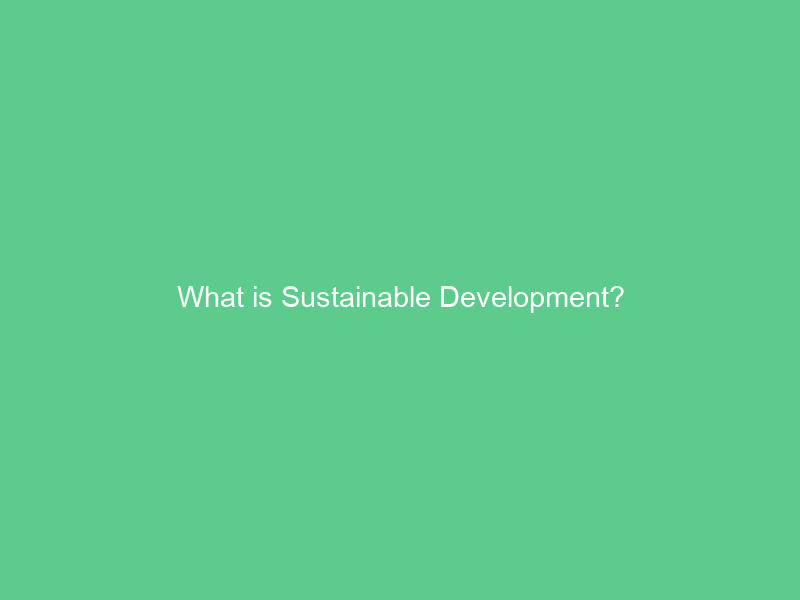Sustainable development is an approach to economic growth which takes into account the needs of future generations. It aims to limit consumption of natural resources and minimize pollution to preserve the planet for human benefit.
However, the Sustainable Development Goals will be challenging to attain by 2030; COVID-19 pandemic, weak global economy and climate change have already hindered progress.
Environment
Environmental sustainability is at the core of many Sustainable Development Goals (SDGs), including SDG 13 (Climate Action), 14 (Life Below Water) and 15 (Life on Land). Environmental sustainability encompasses protecting natural resources, biodiversity, and creating an enabling environment that improves human health and well-being.
One of the greatest challenges of environmental sustainability lies in developing production and consumption practices that fully align with nature’s regenerative capacity. To meet this objective, governments and other duty bearers need to educate citizens, foster responsible economic behaviour, accountable stewardship practices and adopt policies – like pollution pays principle – that help determine acceptable and unacceptable results.
SD’s environmental dimension is often represented with a schematic of three nested ellipses to emphasize that environment forms its base. There may be differing interpretations on what this entails in practice; some “strong” sustainability approaches don’t believe technology alone will solve all resource and pollution challenges and call for lifestyle and economic model adjustments; meanwhile others see innovation playing more of an optimistic role.
Economy
Economic sustainability involves meeting human development goals while protecting natural systems’ capacity to supply resources and ecosystem services essential to society (Basiago 1999; Rostow 1978). Sustainable development refers to meeting present needs without jeopardizing future generations’ ability to do so in the same manner.
Economic theory has often assumed that natural resources are unlimited, placing heavy reliance on technology for replacement purposes (Du & Kang 2016). Unfortunately, modern economic systems have far exceeded natural resource capacity, forcing an overhaul of traditional economic postulates.
Sustainable business practices can contribute to sustainable development by encouraging investment in renewable energy sources and eco-friendly technologies. Furthermore, businesses that adopt such practices tend to hire locally and spend their money within their community more freely – which in turn may contribute to improved socio-economic well-being as well as an increase in profit potential. Find out how you can join this revolution of sustainable business with our online courses.
Society
Sustainable development (SD) can be defined in various ways, but generally speaking its definition revolves around this idea that society should manage economic, social and natural capital in a manner which meets people’s needs while not undermining their ability to meet future generations’. Furthermore, SD assumes the economy must replenish natural resources while simultaneously eliminating unacceptable outcomes; and supporting ecological processes through applying polluter pays principles.
Sustainable development (SD) requires support from all stakeholders – civil societies and governments alike – in order to be successful. Key challenges facing SD include accessing quality healthcare systems, peace and respect for human rights, decent work conditions, quality education and gender equality. Democratic governance and capacity building efforts are needed in order to facilitate SD. Bertelsmann Stiftung and SDSN’s SDG-Tracker helps keep an eye on global SDG objectives globally.
Governance
The Sustainable Development Goals (SDGs) represent an international call-to-action to end poverty and inequality, protect the planet, and ensure prosperity for all. They define a pathway toward reaching these aims that simultaneously balances people with nature; governance also plays an integral part.
Governance refers to the practices and institutions through which authority is exercised. This includes selecting, monitoring and replacing governments; formulating policies in accordance with local traditions and supporting institutions which regulate economic and social interactions between citizens.
Studies on governance’s role in meeting the SDGs have often focused on it from either a conceptual or normative angle. Utilizing simultaneous-equation modelling, this study investigates whether political and institutional governance can serve as a conditional variable that balances all three dimensions of sustainable development for 20 MENA countries using simultaneous-equation modelling. Democratic institutions (universal franchise, regular elections, media freedom/access, civil rights/liberties/rule of law etc) promote progress towards meeting SDGs.

